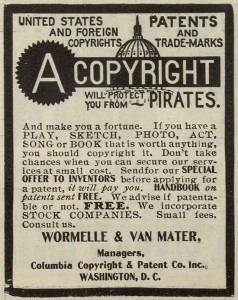
Many people view the internet as a lawless scary place where virtual goods, the lifeblood of starving authors and artists worldwide, is freely traded and stolen. And worst, this is all done without the original creators knowledge or consent. This is the image often portrayed by lawyers and copyright holders around the world when working to protect their personal income. The sad thing is, to an extent, they’re completely right. It’s not difficult to find copyrighted works, especially popular and bestselling works, available for download the day they’re released. While there are many competing views, as content creators ourselves, we should make the best effort to stay on the straight and narrow as we promote ourselves and our works.
It’s not easy to provide good content and still ensure everything is legal. If you’re reading this blog, it’s likely that you’re an author working on your own works. Your words are interesting, your descriptions are captivating, and your audience is enthralled. However, if you’re like me, your drawing abilities leave much to be desired. But fear not, the internet is there for you. A simple google image search quickly gives you many great images that will give your prose that nudge to perfection. It happens all the time, and many times nothing bad comes from it. Perhaps even most of the time, nobody will even notice that the work didn’t belong to you. Some may even think you created it yourself. But, for the sake of argument, what if it was your work that someone “borrowed” and put on their page. No attribution or notice to you. It might make you feel guilty and quickly try to set matters right. Luckily, as technology advances, so does the ability to find content that is freely available to use on your site!
As always, if you’re concerned or have any questions, consulting a copyright lawyer can save you time and money in the long run. Information is freely given, but you ultimately own the responsibility for your own actions.
Images: As with all content, you want to ensure you have the rights and permissions to duplicate and host someone else’s work. While it’s perfectly acceptable to find an image you like on the web and ask the creator for permission, sometimes it’s difficult to know exactly who the creator is. If the owner of a piece of work is ambiguous, you probably just want to avoid the work altogether. When searching for work, look to buy from well known vendors or via trusted sources. A couple well known sites include: Shutterstock and iStockphoto.
If searching for free images, you probably want to look for images that are hosted under the Creative Commons license or listed as Free Use. These images are available by the content creator for your use following certain restrictions. Before using them, ensure you understand what is required and how far the rights extend. Many images, for example, are available to anyone as long as they contain proper attribution and are used for non-profit purposes. A few good sites to find Creative Commons images are to look at the Creative Commons section of flickr or look at wikimedia. You can also do a Google Images search and select “Labeled for reuse” under the usage rights of the search tools. Finally, you can just do a search on the Creative Commons website itself.
Writing: Like using images created by another, written content should be used carefully as well. Everything is given an initial copyright as soon as it is created, and that work should be respected. It is usually pretty easy to get access to bloggers and authors if you wish, so it’s never a bad idea to send a quick email asking for permission. This usually costs you a little time and can be very rewarding in the long run. The original author may even send traffic your way as a token of appreciation of your own work. You should always link back to the original work if possible as well. If not, make sure you give proper attribution and details on how the users can find the work referenced.
In the end, if you are using someone else’s work to help promote yourself. Someone, in the future, may consider doing something similar with your work. Play it forward and do what you can to help improve the current state of copyright on the internet. It may not get any better, but at least you’ll know that you’re one of the good guys. And, better yet, it might keep you free of all legal issues and ensure you can keep writing the good stuff!
